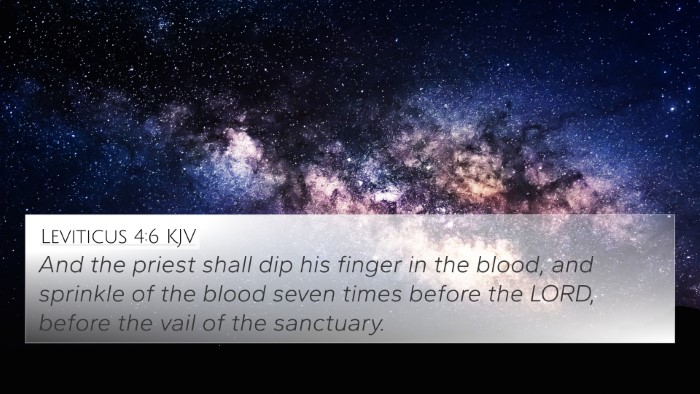Understanding Leviticus 14:16
Leviticus 14:16 states: "And the priest shall take some of the log of the oil and pour it into the palm of his own left hand." This verse is part of the detailed instructions related to the ritual of cleansing a leprous person, emphasizing both the physical and spiritual aspects of restoration in the community.
Significance of the Verse
This verse is essential for grasping the broader context of ceremonial cleansing in ancient Israel and reveals a greater theological principle concerning restoration and purity.
Commentary Insights
-
Matthew Henry:
Henry explains that the pouring of the oil signifies the anointing process, representing God's grace that not only heals but also empowers the individual for service. The ritual demonstrates the priest's role as a mediator and highlights the importance of divine intervention in the healing process.
-
Albert Barnes:
Barnes emphasizes that the oil symbolizes the Holy Spirit and serves as a type of the anointing believers receive through Christ. This act points to both physical healing and the spiritual regeneration necessary for a full restoration to the community.
-
Adam Clarke:
Clarke notes that the oil is a critical component of the purification process and serves an important function in the ritualistic and symbolic aspects of worship. He also highlights the necessity of the priest's involvement, illustrating the need for authoritative blessing in the cleansing process.
Thematic Connections
Leviticus 14:16 connects to several significant themes throughout Scripture:
- Restoration: The act of pouring oil relates to the broader biblical theme of restoration seen in passages like Psalms 23:5 and James 5:14.
- Anointing: The theological implications of anointing can also be connected to 1 Samuel 16:13 and Acts 10:38.
- Purity and Cleansing: This verse finds parallels in John 13:10, where Jesus speaks of spiritual cleanliness.
- Community and Rituals: The communal aspect of ritual cleansing ties to Galatians 6:1, where the restoration of a brother is emphasized.
Cross-References
Leviticus 14:16 is interconnected with numerous other passages. Here are some examples:
- James 5:14 - Discusses the anointing of the sick.
- Psalms 23:5 - "You anoint my head with oil; my cup overflows."
- Acts 10:38 - "God anointed Jesus of Nazareth with the Holy Spirit and with power."
- 1 Samuel 16:13 - The anointing of David as king.
- Matthew 8:3 - Jesus' healing touch aligns with divine restoration.
- John 13:10 - Jesus teaches on the need for spiritual cleansing.
- Galatians 6:1 - Calls for restoring one caught in transgression.
Conclusion
In summary, Leviticus 14:16 serves as more than just a ritualistic instruction; it shines a light on the powerful themes of restoration, the nature of healing, and the importance of divine intervention in the life of believers. Engaging with the cross-references allows for a richer understanding of how this single verse resonates throughout the biblical narrative, inviting deeper exploration of connections between Bible verses and reinforcing the role of scriptural cross-referencing as a tool for spiritual growth.
Further Study Recommendations
For those seeking to delve deeper into understanding Bible verses and their interconnectedness:
- Utilize a Bible Concordance to find related verses more efficiently.
- Engage in Cumulative Bible Cross-Reference Guides for enhanced studies.
- Explore various Cross-Referencing Bible Study Methods to establish connections effectively.
- Consider using Bible Reference Resources to access a multitude of interconnected themes.






